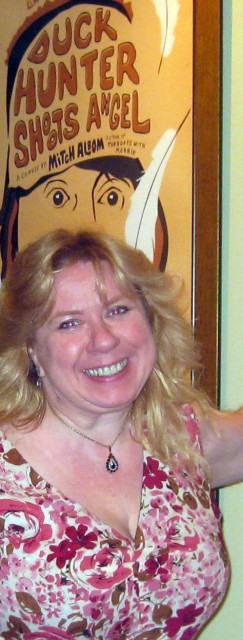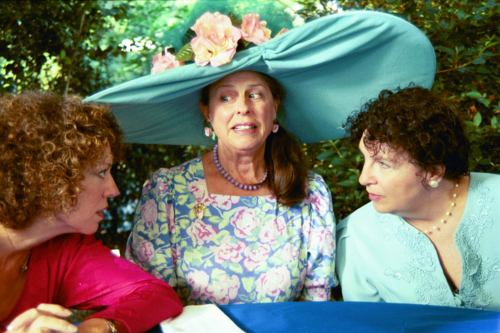
I first met Lorraine at the 2010 Jacksonville Film Festival when John Leary and I were there with Destroying Angel (back then it was called Heaven Sent) and then again at Jacksonville Film Fest 2011 when we were finalists together, John and I with Girl in Trunk and Lorraine with her original screenplay Peace, Love, and Law Enforcement, previously a BlueCat’s ScreenPlay Live! winner.
Lorraine Portman is an award-winning playwright, screenwriter and filmmaker. In St. Augustine, FL, she’s recognized for the plays she’s directed for local theaters, especially The Limelight. Earlier this year she directed the classic Cat on a Hot Tin Roof and Mitch Albom’s (of Tuesdays with Morrie and The Five People You Meet in Heaven fame) Duck Hunter Shoots Angel.
I was lucky enough to see Duck Hunter at the Limelight. It was a five-hour drive for me to get there, but worth every ounce of gasoline. As Portman puts it, the play is about “life choices, faith, racism, how we treat other people, intellectual snobbery, and redemption.” Portman brought her own touches to the play, including extending the role of my favorite character, the Alligator Woman, into that of a silent choric figure whose voguing makes a very audible commentary on the follies of the other characters.
If you missed the play, you can get a sense of it in this clip.
I could go on about Portman’s skills as a stage director for pages (I would love to dedicate at least a page to Portman and Tom Fallon’s set design for Duck Hunter) but this is a series about indie film distribution, so I need to talk about that.
Portman’s website and blog is here. There’s lot’s of information there about Saving Sophie and all things Lorraine.
Given Portman’s habit of carrying off two careers with complete aplomb, it’s no surprise that Saving Sophie started off as a play. Lorraine expanded and adapted a 15 page screenplay to create the one act play, Sophie’s Wedding for Limelight Theater’s first Playwright’s Festival in 2000. During the run, a family funeral inspired a second act. Portman wrote the second act and titled the now full-length version Saving Sophie, which was produced by the Limelight Theatre for the Playwright's Festival during the summer of 2003. She went on to adapt the play to screenplay form.
She produced and directed the film version of Saving Sophie on location in Saint Augustine. Saving Sophie has been programmed in 26 film festivals and has won 9 awards, “Best Feature”, “Best Comedy”, “Best Emerging Director”, and two Audience Choice Awards among them.
Saving Sophie is a quirky comedy about four very different sisters keeping their fragile niece Sophie from going over the edge in the whirlwind of her wedding, a wake, a baby on the way, two dead bodies, three affairs, family secrets that won’t stay secret, a small child who is no stranger to bribery, a large hungry bird, a carpal tunnel epidemic, and a cousin who won’t get out of his dogsuit.
The story was inspired by a “News of the Weird” article about a young woman who walked in on her husband-to-be and the best man…. in a very compromising situation… which was upsetting enough and made even more upsetting because one of them was wearing her wedding dress.
Warren Portman, executive producer and father of Lorraine Portman, called his daughter on finding the article in a local paper. Lorraine had recently gotten divorced and her father comforted her with news of people who had it, at least in his eyes, much worse than she did. Lorraine thought the article was a perfect gem – a seed for a fun comedy - and off to her computer she flew to write the first draft.
The production details:
Saving Sophie was shot on 50 rolls (20,000 feet) of 16 mm Kodak film, in Super 16, on an Aaton XTR owned and operated by Portman, who might just be the only woman working in narrative film who is operating her own camera and shooting her own work. (Portman regularly works as a DP and First AC). It was shot on location in Saint Augustine, Florida, in fifteen days with a crew of eighteen, all but three of them student interns. The film was edited (on Final Cut) and mixed at Pete Winter’s Winterstone Productionsin Tallahassee. The edit to digi beta was done at Cineworks in Miami. The cash outlay was $65 thousand; Portman hasn't tabulated the value of the in-kind donations. She had a lot of local support from cast, crew, locations, costume loans, etc.
Lorraine was kind enough to answer a few questions about Saving Sophie.

Q: Tell us about the script.
Yes. It was first a 15 page screenplay -- I wrote it as a possible thesis film while I was at FSU. It did not get produced. When I moved home to Saint Augustine after grad school I learned Limelight Theater, who I had worked with, was doing a one act play festival. I knew their audience would love the story -- so I turned the 15 page screenplay into a 30 page one act play. Everyone loved the one act Sophie's Wedding, so I started looking for a second act. I wound up at a family funeral and watching my family, I realized the second half could be a funeral. The low budget One wedding, One Funeral. So, I wrote the two act play and then adapted it to a screenplay. Of all the stories and scripts I was working on, I decided to shoot Saving Sophie because the play was so well received.
Q: What steps are you taking to get your feature film distributed?
Saving Sophie has been programmed in 26 film festivals and has won 9 awards, “Best Feature”, “Best Comedy”, “Best Emerging Director”, and two Audience Choice Awards among them.
Before I can go after distribution I need to remix the film -- I used an Andrews Sisters song and a Platters song -- I could barely afford festival rights and now that it looks like I'm going to self distribute, I need songs I can use for free. It was a huge mistake to not work with independent musicians from the very start. I thought the film would find distribution and I felt the songs would help sell the film so I used them -- the film didn't get picked up and now I'm having to pull these songs out.
I'll remix and then be looking for a print on demand place to work with that can make the film available through Amazon. Then I'll talk with the filmmakers I know who have made deals with Netflix and pursue that as well.
Q: What marketing plans to you have?
I'll work social media. Grass roots getting out word. I'll do press releases, national and local. I'll four wall some theaters and do screenings. I'll hit every friend who does radio and try to do interviews and see where I can get my cast in for interviews.
Lorraine teaches Screenwriting, Advanced Screenwriting, & Playwriting at Flagler College. You can follow her blog at http://lorraineportman.com/
